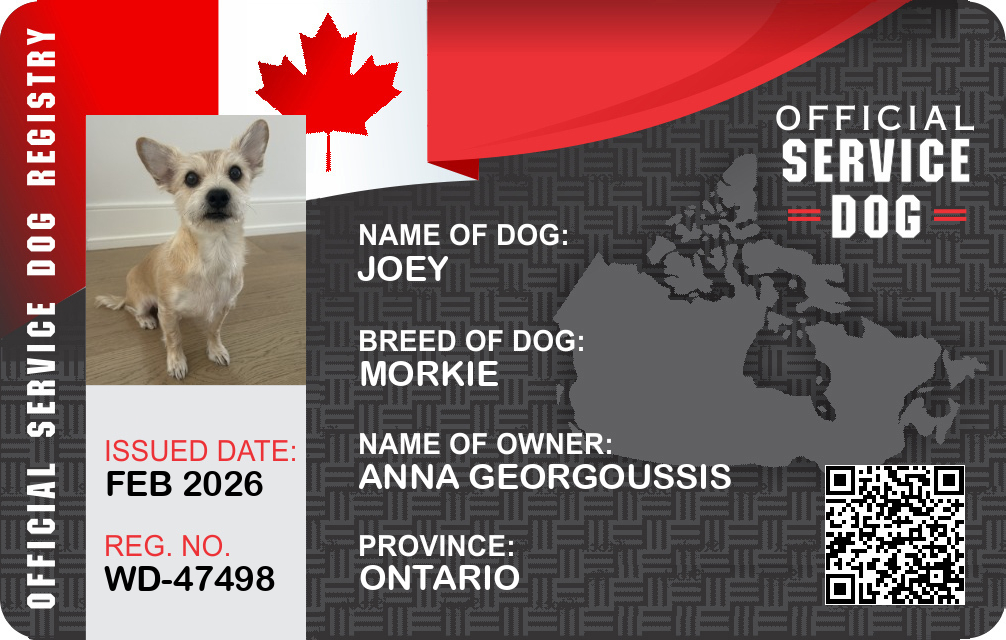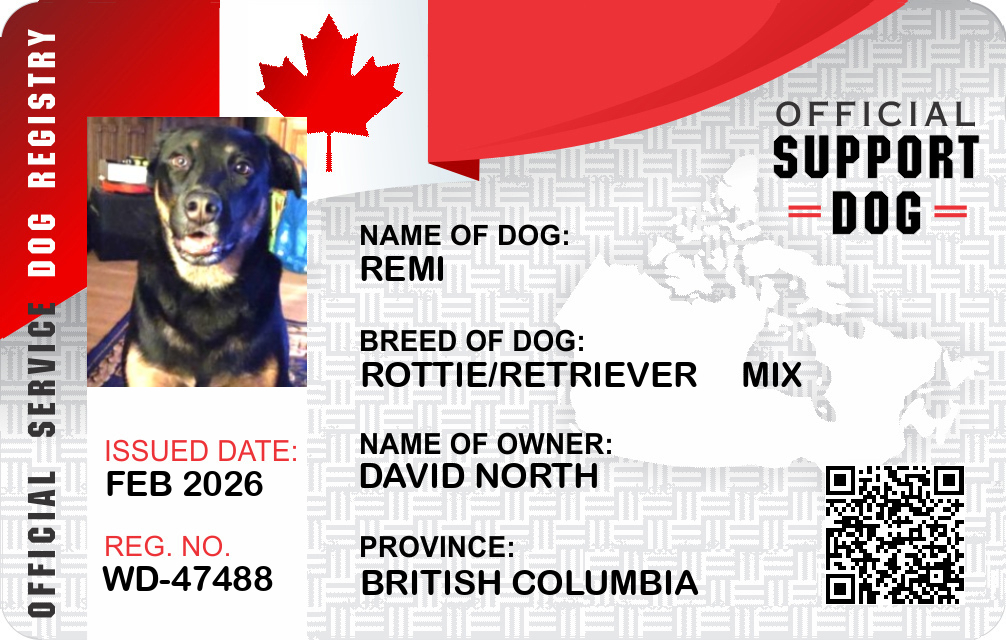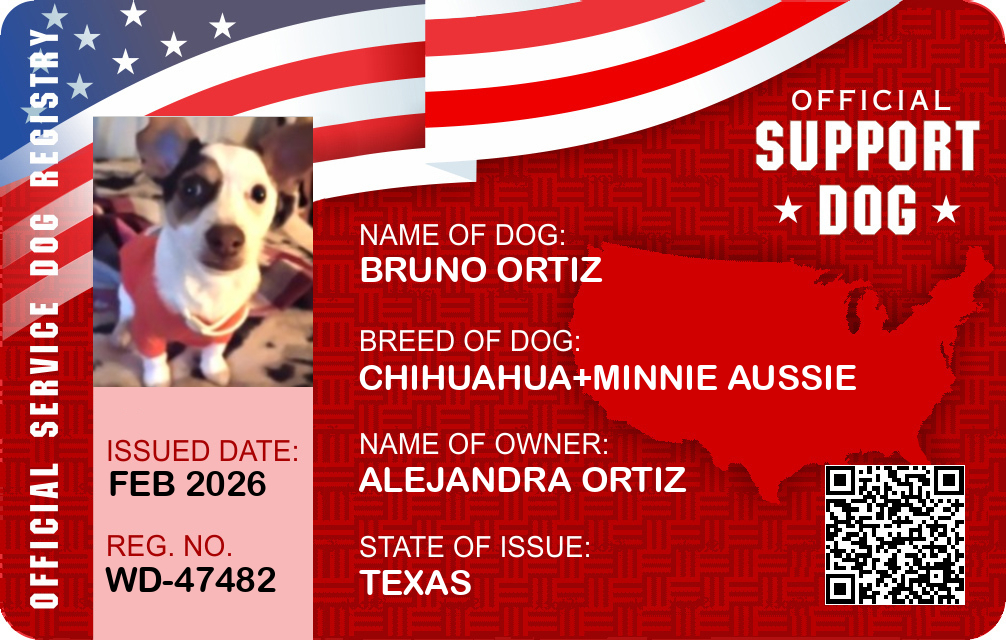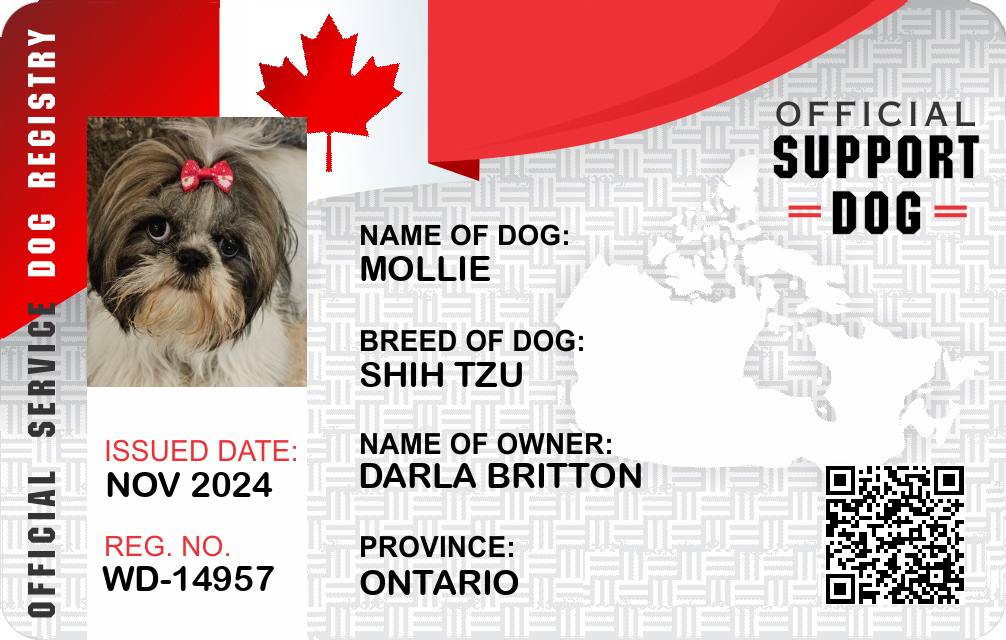District Of Columbia Emotional Support Animal Laws
Get Your Documents
Example State Cards


Overview of ESA and Legal Definitions in District Of Columbia
Emotional Support Animals (ESA) have become increasingly significant for individuals who experience emotional or psychological challenges. In the District of Columbia, understanding ESA laws is crucial to ensuring that both the animal’s and owner’s rights are respected within legal boundaries.
What is an Emotional Support Animal?
An Emotional Support Animal is a pet that provides therapeutic benefits to an individual with a mental or emotional disability. In the District of Columbia, as in most other jurisdictions, these animals are not limited to any particular species. Unlike service animals, ESA do not require specialized training to perform specific tasks related to a person’s disability. Their primary role is to provide comfort and support through companionship.
How ESA Differ from Service Animals
Service animals are specifically trained to perform tasks or do work for a person with a disability. In the District of Columbia, as federally recognized, a service animal is typically a dog that is trained to perform tasks directly related to an individual’s disability. Emotional Support Animals, however, have no such task-specific training. ESA are viewed as pets under local laws but receive certain federal legal protections that surpass those typically extended to pets.
Key Federal Laws Affecting ESA (e.g., FHA, ACAA)
There are pivotal federal laws that impact the rights of ESA owners, including but not limited to:
- Fair Housing Act (FHA): Under the FHA, individuals with ESA are provided certain accommodations in housing situations. Landlords are required to allow ESA, even in properties where pets are typically prohibited, provided the owner can present appropriate documentation.
- Air Carrier Access Act (ACAA): Historically, this allowed ESA to accompany owners in aircraft cabins. However, legislative changes have significantly altered the ACAA’s stance on ESA. Most airlines now treat ESA as traditional pets but maintain legal accommodations for trained psychiatric service animals.
State-Specific ESA Laws in District Of Columbia
While federal laws provide a framework for ESA rights, state-specific regulations further outline how these are implemented within local jurisdictions like the District of Columbia.
Housing Rights and Responsibilities
In the District of Columbia, under the Fair Housing Act, individuals with an ESA cannot be discriminated against due to “no pets” policies. Landlords must offer reasonable accommodations, assuming the tenant provides a legally recognized ESA letter. Landlords have a right to request verification but cannot charge a pet fee or deposit for an ESA.
Public Access and Accommodation
Unlike service animals, ESA do not have the same public access rights. In the District of Columbia, public establishments such as restaurants, shops, and other private businesses are not required to allow ESA. While service animals are permitted anywhere the public can go, ESA are only allowed in housing situations and specific transportation scenarios as federally protected.
Transportation and Travel Rules
Post-amendment of the Air Carrier Access Act, the treatment of ESA during travel has shifted primarily to align with pet policies rather than service animals. ESA are no longer afforded the same access privileges on flights but remain covered under the Department of Transportation’s final rule on service animals if designated as a psychiatric service dog. Ground transportation systems in the District abide by pet policies and vary by company.
Employment and Workplace Considerations
In the District of Columbia, ESA are not covered under the Americans with Disabilities Act (ADA) for workplace accommodations. However, employees can request reasonable accommodation through the District of Columbia Human Rights Act, which safeguards against discrimination based on disability. Employers may choose to allow ESA on a voluntary basis.
Documentation, Requirements, and Processes in District Of Columbia
Navigating ESA documentation can be confusing for owners. A proper understanding of what constitutes acceptable proof is essential for ensuring ESA protections.
ESA Letters and Who Can Issue Them
To qualify for ESA status in the District of Columbia, an individual must obtain an ESA letter from a licensed mental health professional, such as a psychologist, psychiatrist, licensed social worker, or therapist. The letter must state that the individual has a mental or emotional disability recognized by the Diagnostic and Statistical Manual of Mental Disorders (DSM-5) and that the ESA is necessary for their mental health.
Registration, Certifications, and Common Misconceptions
There is no official registry or certification for ESA in the District of Columbia. Misconceptions abound regarding online ESA certifications, which are largely considered invalid without direct consultation and prescription from a licensed professional. Validity is typically linked to a legitimate therapeutic relationship.
Landlord, Business, and Provider Verification Rules
Landlords in the District have the right to verify the authenticity of an ESA letter but must respect confidentiality. They can confirm issuance with the prescribing professional but should not inquire about specific details of the individual’s condition. Businesses can similarly verify status but are not required to permit access.
Rights, Limitations, and Legal Risks
Understanding the balance between ESA privileges and limitations is crucial for owners to make informed choices.
Rights ESA Owners Have in District Of Columbia
In the District of Columbia, ESA owners are entitled to the following:
- Right to reasonable accommodation in housing
- Exemption from pet fees imposed by landlords
- Assurance of non-discrimination in seeking housing
Limits on ESA Protections and Common Restrictions
While ESA enjoy certain protections, their privileges are distinct from those of service animals. Common restrictions include:
- No public access rights in businesses or government buildings
- Restrictions during air travel unless designated as a psychiatric service animal
- No automatic rights to employment accommodations
Penalties for Fraud or Misrepresentation
Misrepresentation of a pet as an ESA or ESA as a service animal is illegal. Penalties include fines and potential eviction. Awareness of specific requirements and adherence to the law help mitigate these risks.
Practical Guidance for ESA Owners in District Of Columbia
Equipping potential ESA owners with practical advice helps prevent legal complications and encourages responsible ownership.
How to Qualify for an ESA Legitimately
To qualify, individuals should:
- Consult a licensed mental health professional
- Obtain a formal ESA letter that complies with FHA standards
- Maintain ongoing communication with their health provider
How to Talk to Landlords, Airlines, and Employers
Effectively communicate by:
- Presenting valid documentation upfront
- Understanding the specifics of protections under federal and state laws
- Engaging in good faith discussions about needs and accommodations
Summary of ESA Laws in District Of Columbia
An emotional support animal is a pet that provides emotional benefit to individuals with mental disabilities through companionship.
- ESA hold certain federal housing privileges but limited public access rights compared to service animals.
- Valid ESA documentation in the District of Columbia must be obtained from a licensed mental health professional.
- The Air Carrier Access Act no longer mandates airlines to accept ESA without fees, aligning airline policies with pet transportation rules.
- ESA owners have specific housing rights, but no automatic rights to have their animals accompany them in public spaces or workplace settings.
- Potential ESA owners should adhere to legitimate processes and remain vigilant against fraudulent services purporting immediate certification.
- Misrepresenting ESA can lead to penalties, highlighting the importance of understanding and respecting legal boundaries.**
This comprehensive understanding of ESA laws ensures individuals and their emotional support animals are both respected and compliant within the District of Columbia.
Get Your Documents
Example State Cards













